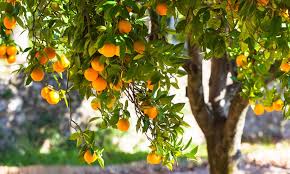Sherman Hesselgrave’s homily for Advent 2, December 8, 2019
Readings: Isaiah 11:1-10 Psalm 72:1-7, 18-19 Matthew 3:1-12
Nothing will spike blood pressure quite like hypocrisy. “You brood of vipers!,” John the Baptist says to the Pharisees and Sadducees who have come to the Jordan River for baptism. Later in Matthew’s gospel, Jesus will liken Pharisees and teachers of the law to “whitewashed tombs.” The veneer and the interior life lack integrity. My liturgics professor in seminary was a Jesuit who described a well-integrated person as someone, who no matter how or where you engage with them, you have a sense of the whole person. There is a consistency, an integrity, no matter where your lives touch.
This is a theme that flows through Jesus’ public life and teaching, and he uses the metaphor of bearing fruit regularly. Trees are known by the fruit they produce, and whether that fruit is any good. We have all had the experience of sinking our teeth into a gorgeous-looking peach, apple, or plum, only to be disappointed by its mealy texture or bland flavour. On this Second Sunday of Advent, when John the Baptist is always the focus, we are confronted today by his imperative to “bear fruit that befits repentance.” I would like us to take a moment to unpack John’s statement, by taking a closer look at repentance and bearing fruit.
A couple weeks ago the preacher focussed on Jesus’ words from the cross: “Father, forgive them, for they don’t know what they are doing.” Like John the Baptist and Jesus, forgiveness and repentance are cousins. The biblical Greek verb for forgiveness means ‘to let go of something.’ The word for repentance, μετάνοια, means ‘to change one’s mind’ or ‘to be remorseful.’ Whenever one changes one’s mind, one has to let go of one mindset to adopt another. Park that thought for a moment, while we look more closely at ‘bearing fruit’.
One can think of bearing fruit simply from the superficial viewpoint of productivity: how many bushels, how many pounds, how many gallons. But when we think about what fruit really is, we are transported to another place. Fruit, after all, is designed to guarantee the future of a species. It is more than just produce in a supermarket. It contains the genetic material to perpetuate itself, genetic material that may have changed over the millennia to become resistant to certain pests or to adapt to changes in climate. In some ways bearing fruit is like what we in church land call Tradition. There is a difference between we’ve-always-done-it-this-way-before and Tradition. We’ve-always-done-it-this-way-before is the definition of a mindless habit. Tradition, which has evolved over time, has embedded within it WHY we do what we are doing, and how we may have changed how we do that over the generations. Bearing fruit, like Tradition, points toward the future, with a trajectory from the past, including ancient or even primordial DNA.
Bearing fruit that befits repentance ties in with our second reading today, from Harry Williams’ True Christianity:
It is only when we actualize our generous feelings in concrete, particular material action that heaven is established in our midst. When we meet the hungry and feed [them], the thirsty and give [them] drink, the stranger and take [her] in, the naked and clothe him, the sick and visit [them], the prisoner and go to him, it is then and only then that our generosity is the medium of God’s presence in the world. For the Word must be made flesh, and to be made flesh is to engage in particular concrete action.
Remember I asked you to park the thought that whenever one changes one’s mind, one has to let go of one mindset to adopt another for a moment. Picking up that thread again, if our interior self is in synch with the Christian self we proclaim publicly, then there will be outward and visible signs of that inward and spiritual grace. We live as a sacramental presence in the world. Whatever we touch—whether they be encounters with strangers on the street, relationships with others at work, drivers or cyclists we share the road with, interactions with our children or our parents or siblings—whatever we touch will be marked with the DNA of God’s grace carried in us.
Another thing about fruit-bearing is that new varieties and hybrids of fruit can be created, with amazing new flavors and textures. I remember the first time I had a pluot, which is a cross between a plum and an apricot. Wow, what an amazing creation! When I lived in Oregon, I used to drive up the Columbia River gorge to the apple orchards near Hood River every October to buy varieties of apples that never make it into supermarkets. As I think about those lovely scenic drives it occurs to me that we at Holy Trinity are embarking on some hybridization of fruit-bearing of our own, as we continue to live into our strategic planning adventure.
Since last summer, I have been noting that I am in the cycle of last things: my last three-parish picnic in June; this is my last Advent and Christmas at Holy Trinity; the first Sunday of March will be my last Annual Vestry. But for all of you, the community is on tip-toe to a new chapter that will have delights and challenges and surprises as you move into the future God has in store for you and this parish.
Perhaps it is appropriate that I end with Isaiah’s vision of a future that seemed unimaginable, given the political upheaval and displacement God’s people had experienced. A shoot sprouting from the stump of a tree that has been cut down will become a branch that lives on, producing the Peaceable Kingdom where the “wolf shall dwell with the lamb, and the leopard shall lie down with the kid and the calf.” Last night I went to a wonderful Tafelmusik concert of Italian Baroque Christmas music that included a song, “For the birth of Jesus”:
When the little boy was born in Bethlehem
it was night, but it seemed like noon,
The stars had never been seen
shining so beautifully,
and the brightest one
went to call the Magi from the East.
There were no enemies upon the earth:
the sheep grazed together with the lion;
you could see the baby goats
playing together with the leopard;
also the bear and the calf,
even the wolf was at peace with the baby sheep.
Even in 17th-century Italy, the hopeful vision of Isaiah saw its incarnation in a baby boy born in Bethlehem centuries before. Bearing fruit befitting the mind of Christ that fills our imaginations means engaging in particular concrete action for the sake of the world God created.
Like many of you, I’m sure, cute animal videos regularly pop up on my social media feed. A recent video made me wonder if Isaiah’s vision isn’t creeping into being through another corner of the animal kingdom. I’m thinking of the video that shows a cat with a mouse in its mouth—a sight I have seen many times—only this time the cat delivers the mouse to the cat’s own dish of crunchies, and joins the mouse in a banquet where, apparently, all are welcome.
In this season of hope, let us find hope wherever we may. We know all too well the assault on creation, on the marginalized, and on human dignity and freedom. May we stand firm, taking particular concrete action to let the world know that God is not done with us yet.






